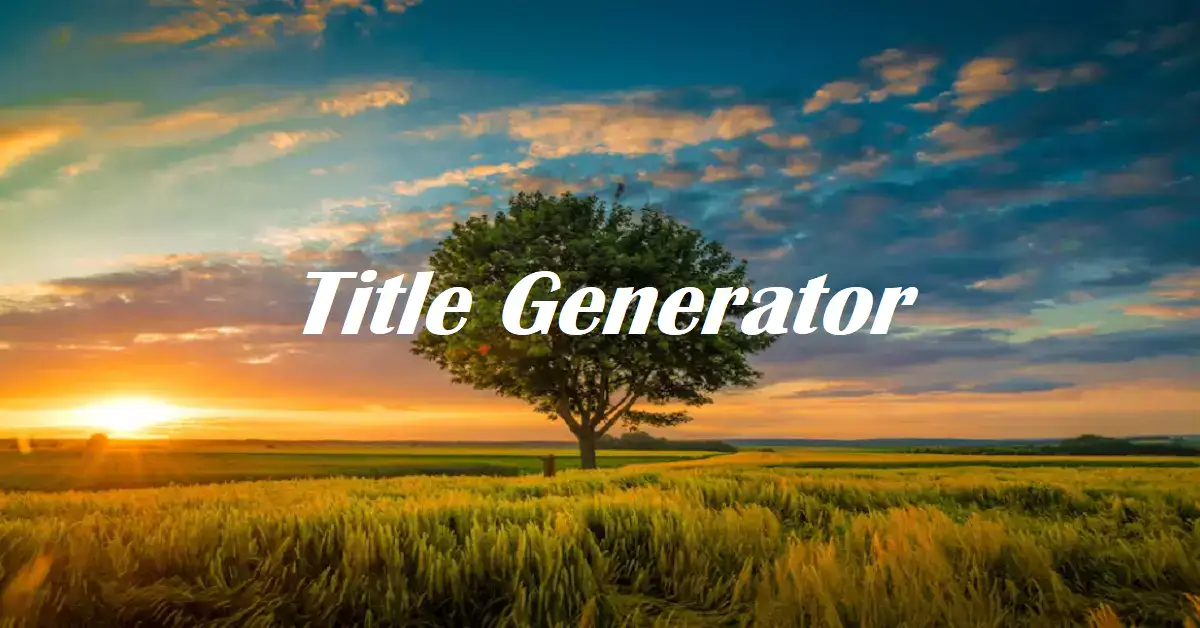If you’re struggling with your book or content title, you’re in good company! Today’s absolute best book titles were born only after much gnashing of teeth. The same name as the sun rises was once a party. Pride and prejudice were once primitive feelings. Then, at that time, there was F. Scott Fitzgerald, who used a great deal of time to consider a decent title generator. He eventually tackled twelve (The Gold-Hated Gatsby, The High-Skiping Sweetheart, and West Egg featuring Trimalchio) before reluctantly choosing The Incomparable Gatsby. So it’s intense for a writer, so we made this generator: to give you some inspiration. Any titles you score through this are yours to use. We’ll be more than happy to assume you’ve left us an example of overcoming difficulties. Assuming you want significantly more flash behind our generator, the web takes care of you.
Incipration Character:
If your focal person has a particular name or Title (such as expert or investigator) you can integrate it into the Title of your book. Just consider Jane Eyre, Percy Jackson, or Harry Potter, for example – working with at least one of the names of your characters is a reliable way to narrow down ideas for specific topics. Similarly, you can add a bit of detail, like Thomas Strong’s Jude the Dark, to add a bit of tone to a name and make it admirable.
Keep Your Mind Setting:
Has your book taken a particularly interesting or critical place? Regardless of whether your Title isn’t precisely where the action takes place (like George Eliot’s Middle March), it’s worth talking about keeping in your subconscious. You can add different nuances, such as The Wizard of Oz by Honest Baum or Cookout at Draping Rock by Joan Lindsay, to give your users a sense of activity and character, as well as setting (which are usually associated will), can provide.
Famous Phrases:
Think of Harper Lee’s To Kill a Mockingbird here—it’s a central image and a huge conversation piece in the book. It is cryptic (what does it mean? is it a warning? or guidance?), and when these words appear in the original text, they make us sit in their true meaning. Try and think about your motivation for your book review or flesh out your focal topic in a few words, and see if that sparks anything.
Analyze Related Title:
You might be surprised by the number of books that refer to different works in their titles (The Decline in Our Stars by John Green comes from Shakespeare’s Julius Caesar, and Steinbeck’s Of Mice and Men (takes its inspiration from Robert Conscious’ sonnet). Taking this course allows writers to use a generally elegant and dramatic style of expression that suggests a theme in their book. From Ernest Hemingway’s For Whom the Chime Rings to Philip Pullman’s His Dim Materials, countless books have used this strategy that can work for you, too.
Subtitle:
In the collective realm, this training is highly unusual. There is a pattern of suggestive or animated titles in verifiable distribution, backed by a caption that conveys the substance (and filled with heavenly catchphrases that the Amazon web search tool can’t help). In America, it’s equally considered very common to have “a book” as a title (if, you know, it’s a book). It’s another way to get similarly long titles and add a bit of panache to a generally dry subject.
Reading the Content:
Assuming you’ve gone through the above and all are racking your brains trying to come up with a wonderful recipe – don’t panic! Similar to the title generator, there are alternative methods of resonating pinions and producing excitation.
